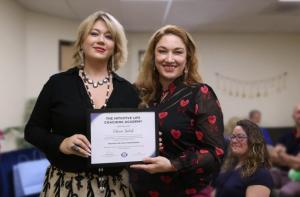
Katya Dmitrieva, Founder of The Intuitive Life Coaching Academy of the Third Eye
Katya Dmitrieva had been an intuitive life coach for 13 years and had been thinking for a while about teaching her profession to others when, at what seemed an inopportune time during the pandemic, she launched The Intuitive Life Coaching Academy of The Third Eye (ILCATE) in San Ramon, California.
“I coached people one-on-one and also ran some meetups, but in August of 2020 I made a decision during one of our meetups to actually teach some of my clients intuitive coaching,’’ she said. A month later her first class of aspiring intuitive coaches was convened and, in true entrepreneurial fashion, Katya improvised her curriculum as she proceeded.
“I’m grateful for my first class, because they allowed me to create that program while we were in session,” she said. “It was only me who ran all the classes and did everything. As people started to graduate, I started to get teachers in training, who were previously my students. They joined our academy, helping me on the administrative and marketing side.”
Accreditation
The first class for aspiring intuitive life coaches was launched in September of 2020. The program was accredited by the International Coaching Federation around that same time, an arduous but worthwhile process, Katya said.
“It was a difficult process,” she said. “ICF is changing their accreditation requirements, so we had to submit new materials for that. They will have first and second level accreditation. We have second level accreditation, which is the highest level. Accreditation with such a serious organization like ICF is very important, because the life coaching profession is getting more regulated.”

What distinguishes an intuitive life coach?
Anyone who has spent ten minutes on LinkedIn will quickly realize that coaching is a crowded industry these days, which raises the question of what distinguishes an Intuitive Life Coach from any other sort of coach. Katya stresses that an intuitive life coach doesn’t give answers, but is there to help clients find their own answers.
“We’re not trying to be liked or to say what our clients want us to say, or what they want to hear,” Katya said. “We really go deep and try to understand the person and help them to see themselves in a powerful light, to find the answers within to understand what they really want.”
Which sounds somewhat like what a therapist does, but there is an important distinction between life coaching and therapy.
“The difference between life coaching and therapy is that therapy goes from dysfunctional to functional, while coaching goes from functional to the highest potential,” Katya said. “It’s about changing your mindset, changing your limiting beliefs that you’re not good enough, not smart enough, that something is wrong with you. How can we change the negative narrative that we constantly tell ourselves? An intuitive life coach tries to understand the person so that they understand themselves and make the changes in their lives that propel them to grow, succeed and be happy.”
Be prepared to improvise
There are as many reasons and motives for seeking a life coach as there are people in need, but often they seek answers that no reputable coach will give, Katya said.
“Some people ask me, ‘will you teach me how to live my life?’ and I tell them no!” Katya said. “Life coaching is a partnership with the client. We listen intuitively and we ask questions that provoke answers from the client. We believe and trust that clients are resourceful, smart, capable people who can find the answers within. We take away the need to come up with solutions or tell people what to do. Life coaching is about empowering your clients to realize that they have all the answers and they have the wisdom within.”
The program at The Third Eye prepares aspiring intuitive life coaches to deal with that infinite variety of client needs and aspirations. “Students create their own exercises and tools, because during the session with a client, you have to improvise, you have to come up with different ideas and tools,” Katya said. “You have to be fluent in coaching, you have to be fluent in your intuition and creativity, so we incorporate all that into our professional life coaching program.”
Those skills are helpful to many professionals.
“This program helps even the people who don’t become a life coach,” Katya said. “We have lots of doctors, chiropractors, massage therapists and others who are helping and healing. They want to understand patients who have something happening in their body that they don’t know how to articulate it. It’s a program for people who want to grow, who want to take their businesses to the next level. It will teach you communication strategies, communication skills, strategies for sales. Graduates of the program tell me that their business is booming after taking this program because they are able to talk to their customers, clients, patients in a different way.”
The business of being an intuitive life coach
Naturally, many of the people enrolled in the program do want to launch their own intuitive life coaching practice, which means grappling with all the usual challenges of starting a business. The program at The Third Eye prepares its students to succeed.
“We offer a one month business module, where we teach how to start your coaching business, how to go from zero to your first 10 clients, and how to actually keep it going,” Katya said. “To really support our graduates, our continuous education classes will be focused on more advanced coaching modalities, more intuitive development, going deeper into learning business skills like social media, operations, marketing, and sales.”
A big aspect of the program at The Third Eye is the supportive community of graduates, particularly among those who are launching their life coaching practices. “We educate our community about what life coaching is and what life coaching is not, and we support our students after they graduate,” Katya said. “For example, we offer free group coaching to our community every third Tuesday of the month. Anyone can get free coaching, and our graduates are able to practice coaching. It’s a win-win situation.”
But does the world need more coaches? Katya is emphatic that it does.
“This world right now needs good coaches,” she said. “With everything that’s happening, we need healers, therapists, coaches, mentors. People are talking now more openly about mental health, about mindset for success. There is a huge demand for practitioners, but you know, they better be good.”
Published First on GritDaily. Read Here.
Featured Image Credit: Photo by Nacho Juárez; Pexels; Thank you!





